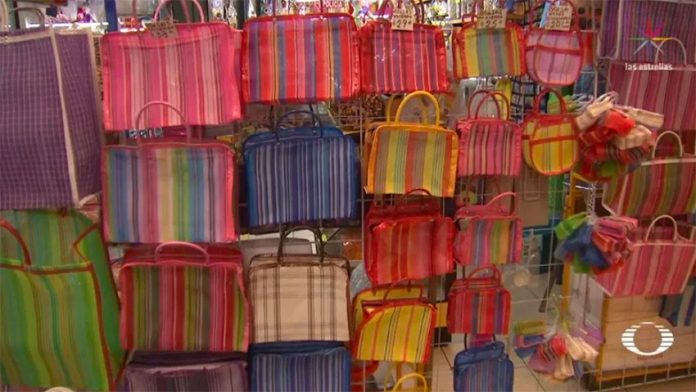Traditional reusable shopping bags seem to be making a comeback in Mexico City, where a ban on single-use plastic bags went into effect on January 1.
The use of cloth and mesh bags, along with those affixed to contraptions that look like handtrucks, have always been a relatively common sight in traditional markets and popular with housewives in the city’s lower-class neighborhoods.
“We are returning to fiber and plastic reusable shopping bags. We have bags in different sizes that cost 15 pesos, along with [others] costing 10, 25, 40 and 45 pesos. They are washable and reusable,” commented a merchant at the Jamaica Market southeast of the city center.
In some stands, especially those selling spices and grains, the cucurucho is making a comeback. This is a sheet of butcher paper spiraled into a cone shape, twisted, filled and folded for carrying.
One very traditional shopping bag is that made of ixtle, a fiber that dates back to the pre-Hispanic period. It comes from the maguey plant, whose thick leaves are beaten to separate the pulp and liquid from the support strands that become the fiber. Depending on the age and size of the leaf, these fibers can be as soft as cotton or stiff enough to make brushes.
Most ixtle fiber is on the more flexible side and has a texture similar to burlap. Carrying bags of all kinds have been made from the material.
Although ixtle shopping bags are sold in the city’s traditional markets, versions in plastic fiber are more popular because they are cheaper and withstand getting wet.
At the Hidalgo Market in the working-class Doctores neighhorhood, such bags were common enough before, but are ubiquitous now.
Many supermarkets are promoting cloth bags with their logos as people are getting used to the idea of needing to bring their own bag.
Reaction to the ban weeks after its implementation seems to be positive. Comments from both merchants and customers in the city indicate an awareness of the need to decrease dependency on the bags, either enthusiastically or with resignation.
The city tried to implement mandatory garbage separation a few years ago, but failed. The reason was probably that residents have always seen garbage collectors separating trash for recyclables and did not see the need to do that work themselves.
Store owner Tina Chavez notes that customers are adapting to the need to bring a bag as they know that merchants are subject to stiff fines if they give out the plastic ones. The only exception to this rule is bags for meats and fresh produce.
According to environmental groups in Mexico, every family was throwing out on average 650 plastic shopping bags per year. Sometimes these bags, which need at least 100 years to completely decompose, were used only for a few minutes.
They also state that about 80% of the waste generated in the world is from disposables. By 2050 almost 100% of all marine birds will have ingested some kind of plastic, and 15% of endangered species will be affected by waste plastic, according to Marina Robles, the secretary of the environment.
Coming up in 2021 are laws banning the use of disposable plates, silverware, straws, and balloons. Even some street stands in Mexico have already started asking customers already to bring containers if they are asking for food to go.
Source: Televisa Noticieros (sp), El Universal (sp)
